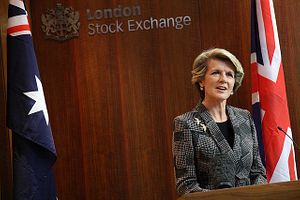On Wednesday, Australian Foreign Minister Julie Bishop addressed the United Nations’ Security Council in New York on the need to combat terrorism globally. Bishop was chairing a Security Council meeting on counterterrorism, telling its five permanent members and others such as Syria and Saudi Arabia that terrorism and homegrown terrorism are among the greatest threats to global security.
“Terrorists are younger, more violent, more innovative and highly interconnected. They are masters of social media – to terrorise and to recruit – and are very tech savvy. They incite each other. They communicate their propaganda and violence directly into our homes to recruit disaffected young men and women.”
Combating this is of the utmost importance and assistance must be given to build capacity in this area, said Bishop in a speech that was widely praised. A “strategic” approach is very necessary.
The foreign minister then spoke the next day on the importance of international peacekeeping and policing, with particular reference to Australia’s work in East Timor and Vanuatu.
Australia is currently president of the Security Council, a rotating position for non-permanent members. The membership ends next month, after the standard two-year period. Australia has seemingly used its position to its advantage, notably when it introduced a resolution demanding that armed groups give up control of the area around the MH17 crash site. The resolution was unanimously supported in the UNSC, even by permanent member Russia. The current Coalition government in Australia has, of course, been keen to act forcefully on the MH17.
What is interesting is that Bishop’s turn at the UNSC would not have seemed so likely when Australia took up its position. The previous Labor government campaigned and spent hard for the job, a particular aspiration of Kevin Rudd, a former diplomat whose fascination for foreign affairs was mocked by the then-Opposition Liberal Party. It was Rudd who believed Australia’s position on the UNSC might be secured by more international commitments such as memberships of varied development banks, including the African Development Bank, despite limited Australian economic or strategic interests in Africa. Notably, Bishop said at the time, “There really has been no justification for the benefit that will accrue to Australia by pursuing a seat at this time.”
Sydney Morning Herald political correspondent Latika Bourke wrote yesterday, “A defining moment in the early life of the Abbott government, Bishop’s commanding performance kick-started discussion about her capacity to deliver and potential to lead. Ironically, it was the Security Council seat she fought so hard to oppose that has helped make her public rise possible.”
UN Secretary General Ban Ki Moon praised Bishop and Australia’s recent hosting of the G20, despite Australian Prime Minister Tony Abbott being mocked for using his address to the nineteen world leaders of the G20 to berate the Australian public for not accepting his proposal for a A$7 ($6) “co-payment” for visits to the doctor, parodied here. On the one hand, as we have written, there has been a stronger international bent to Tony Abbott’s tenure than might have been expected, yet at other times Australia has remained stubbornly myopic on numerous issues, such as asylum seekers.
Interestingly, widely read conservative columnist and blogger Andrew Bolt believes the opposite, using his Thursday column in the Melbourne tabloid The Herald Sun to suggest that the government has spent too much time on foreign policy, which is rarely a vote-getter and may be part of the reason the Coalition lags in the polls behind Labor despite a near-silent Opposition.
One of Bolt’s other recommendations to the government – there were a series of quick points – was that Australia should have, essentially, told U.S. President Barack Obama to shove it over his global warming speech. Bishop must seemingly have taken the advice to heart: She attacked the speech during a live interview from New York with the ABC’s 7.30 Report. Obama spoke to the University of Queensland over his concerns of the threat of global warming to the Great Barrier Reef; Bishop countered, saying that her government was demonstrating “world’s best practice” in its preservation and “I think that President Obama might have overlooked that aspect of our commitment to conserving the Great Barrier Reef.” Though not actually “chiding this showpony” (in Bolt’s words) it was an unusual move: Australia does not often attack a sitting U.S. president given the close alliance (deemed its most important by Australia). With the widespread excoriation of Australia’s climate change policy – even the Tory Party wonders at Canberra’s defense of a reliance on coal – after the U.S.-China deal announced before the G20, perhaps it made sense to defend one domestic policy while pursuing foreign policy goals. And Australia, after all, now has a dog in the fight when it comes to publicly fighting homegrown ISIL supporters.
Helen Clark was based in Hanoi for six years as a reporter and magazine editor. She has written for two dozen publications including The Diplomat (as Bridget O’Flaherty), Time, The Economist, the Asia Times Online and the Australian Associated Press.
































